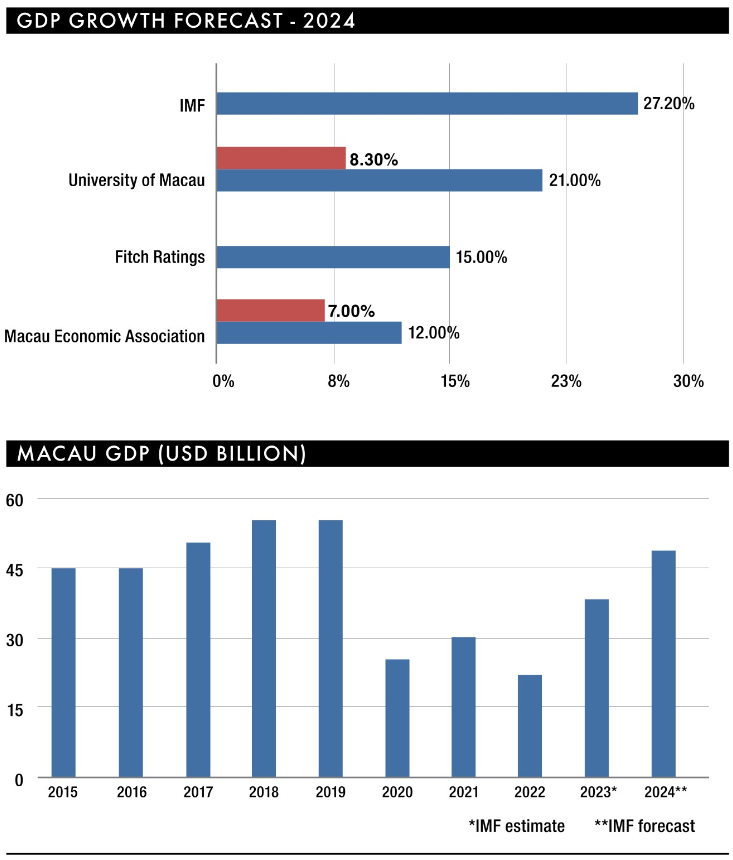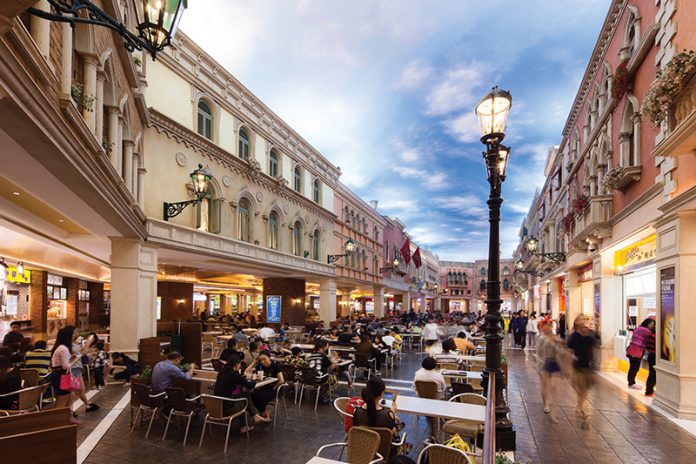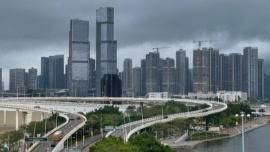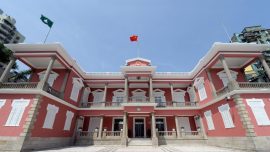The Macau economy is expected to grow between 7 per cent and 27 per cent in 2024, according to different forecasts, fuelled by the resurgent gaming and tourism sectors, but the trajectory of the mainland Chinese economy, fluctuations in interest rates, and other global uncertainties may slow down the city’s recovery
By Tony Lai
Despite the gradual recovery of the Macau economy in the past year in the post-Covid era, the international rating agency, Moody’s Investors Service, surprisingly downgraded Macau’s outlook from “stable” to “negative” in December. The downgrade was attributed to concerns about the city’s close ties with the weakening mainland Chinese economy.
In response to Moody’s rating change, the Macau government emphasised that the city’s close ties with the mainland “provide strong support for Macau’s long-term development”, adding both the mainland and Macau economies have been “steadily” recovering over the past year.
While Moody’s concerns about Macau may seem far-fetched at the moment, as the local economy is projected to expand up to 27 per cent in 2024 due to the ongoing resurgence of tourism, the slowing momentum of the mainland economy and global uncertainties could hinder the city’s path to recovery.
In early December, Moody’s also lowered its outlook for mainland China’s sovereign credit rating to “negative” from “stable”, raising doubts about the mainland’s ability to address local government debts and stimulate growth amid a plunging property market. Moody’s subsequently applied a similar change to Macau’s outlook, stating, “The change in Macau’s rating outlook to negative reflects Moody’s assessment of tight political, institutional, economic and financial linkages between Macau and the mainland.”
“[Macau’s] tourism and gaming sectors are heavily dependent on China, while its banking system is similarly exposed to cross-border claims to the mainland,” the agency added.
In the wake of the downturn of the past three years, the Macau economy, driven primarily by the gaming industry and tourism, experienced a rapid rebound in 2023 after Covid-related travel restrictions were lifted. The latest official data showed that the city’s gross domestic product (GDP) expanded by 77.7 per cent year-on-year in real terms during the first three quarters of 2023, reaching about 70 per cent of the size of the pre-Covid economy.
“The contraction of the real estate market [in mainland China], as well as local government and corporate debt, will impact residents’ income” – University of Macau study

Steady recovery
Despite the challenges, Joey Lao Chi Ngai, president of the Macau Economic Association, remains cautiously optimistic about the economic fundamentals of the city in 2024. Acknowledging the persisting external economic uncertainties, he highlights the global economy’s struggles with weak international trade, financial market volatility, and rising debt pressures.
“We believe the GDP [for 2023] can round out with a growth of 80 per cent, and the GDP in 2024 can achieve a growth rate of 7-12 per cent,” he states. “This means that the size of the local economy in 2024 will recover to about 85-90 per cent of the 2019 level.”
Mr. Lao also observes that not everyone in the city can benefit from the local economic recovery, particularly merchants in neighbourhoods affected by changes in the consumption behaviours of tourists and residents. “[Stakeholders] should explore new tourism and commercial offerings in these neighbourhoods to address the problem,” he adds.
“Strong performance in gaming tourism will also be bolstered by the government’s stepped up efforts to boost long-haul travellers and greater utilisation of the Hong Kong-Zhuhai-Macau Bridge in the coming year” – Fitch Ratings
Gaming-driven
Another international rating agency, Fitch Ratings, also holds a glossier outlook on the Macau economy. In its recently published report on the Greater China forecast for 2024, the agency predicts that while mainland China’s economic growth will ease from 5.3 per cent in 2023 to 4.6 per cent the following year, Macau’s GDP growth will remain robust at 15 per cent in 2024, following a surge of 76 per cent in the previous year.
Fitch’s confidence in the Macau economy stems from the ongoing recovery of the gaming industry. Macau’s gross gaming revenue skyrocketed by 324.9 per cent year-on-year to MOP164.5 billion (US$20.5 billion) in the first 11 months of 2023. The gaming revenue for the entire year is poised to exceed MOP180 billion, a 20 per cent increase from the government’s original forecast.
“Strong performance in gaming tourism will also be bolstered by the government’s stepped up efforts to boost long-haul travellers and greater utilisation of the Hong Kong-Zhuhai-Macau Bridge in the coming year,” Fitch stated in the report. The agency further projected that the gaming revenue in 2024 could expand even further to around MOP231 billion, as the Macau government has set an expectation of MOP216 billion in gross gaming revenue for casinos in 2024. “We expect fiscal buffers [of Macau] to remain substantial, equivalent to more than five times our projected 2023 budget expenditure – a key credit strength,” Fitch remarked.
Nonetheless, the city has been steadfast in its commitment to reducing reliance on casino gaming in recent years. It has put forward the “1+4” diversification strategy, which aims to transform Macau into an international tourism destination and foster growth in four emerging sectors: health and wellness, modern finance, technology, MICE (meetings, incentives, conferences, and exhibitions), culture, and sports. Concerning the city’s diversification efforts, Fitch noted, “Human capital constraints and skill mismatches will remain key challenges for the territory to substantially reduce its overwhelming dependence on the gaming sector.”

Drag?
Despite the lifting of Covid-related travel restrictions and reassurances from authorities regarding the economic fundamentals, mainland China’s economic growth has fallen short of expectations, according to analysts and observers. In a report on the outlook of the Asian economy, the International Monetary Fund (IMF) referred to the mainland’s performance as a “drag”, citing factors such as the heavily indebted property sector, lower productivity growth, and the ageing population.
“A more protracted real estate crisis and limited policy response in China would deepen the regional slowdown,” IMF warned, forecasting the growth of the mainland to slow to 3.5 per cent in 2028 from about 5.4 per cent in 2023. According to the agency, local government debt in the mainland reached RMB92 trillion (US$12.6 trillion), or 76 per cent of its economic output in 2022, representing an increase from 62.2 per cent in 2019.
Market data also reveals a significant surge in capital outflows from the mainland in recent times. In September 2023 alone, the outflows amounted to US$75 billion, marking the largest monthly exodus since 2016. Additionally, during the third quarter of 2023, the mainland experienced a negative flow of foreign direct investment (FDI) for the first time since 1998.
Other analysts in the international community share a similar sentiment. “The 2024 challenge for the Chinese economy will not be GDP growth… The challenge will be that the only direction from there is down,” Derek Scissors, a senior fellow at the American Enterprise Institute, a centre-right think tank in the United States, expressed his views in an interview with CNN. “Without sharp policy changes, there’s no bounceback for China — the 2030s will be worse than the 2020s.”
But the mainland authorities have made commitments to implement additional measures to stimulate growth. Pan Gongsheng, the central bank governor in the mainland, recently stated during a public event that the authorities will persist in rolling out structural reforms to reduce dependence on infrastructure and property for growth. “I’m confident that China will experience healthy and sustainable growth in 2024 and beyond,” he added.
“The development of the in-depth cooperation zone [Hengqin] can also facilitate the service exports of Macau and attract investments to the region” – Samuel Tong, Macau Institute of Management
Spending power of mainland visitors
Scholars at the University of Macau are closely monitoring how changes in mainland China might impact the city. In their forecast on the Macau economy, the Centre for Macau Studies and the Department of Economics at the university stated, “Macau will face uncertainties about the economic development in mainland China in 2024.”
“The contraction of the real estate market, as well as local government and corporate debt, will impact residents’ income, leading to a decrease in their interest and purchasing power for travelling to Macau,” stated the university, stressing that visitors from mainland China continue to be “the main factor affecting the development of Macau’s economy”. Despite the government’s recent efforts to attract more international tourists, mainland China remains the largest tourist source market, accounting for over two-thirds of total visitation to Macau in the first 11 months of 2023.
Consequently, the university forecasts that the city’s GDP could expand by 21 per cent, accompanied by a 26.7-per cent increase in service exports (including gaming services), assuming there is a higher growth rate in mainland visitor arrivals. However, if the slowdown in the mainland economy has a more severe impact, the university predicts that Macau’s GDP would only rise by 8.3 per cent in 2024, with a 10.3-per cent increase in service exports.
Furthermore, the university envisions that the city’s private consumption expenditure, which has already recovered to over 98 per cent of the pre-Covid volume in 2023, will increase between 5 per cent and 5.3 per cent in 2024. Meanwhile, the gross fixed capital formation, which has recovered to nearly 80 per cent of the pre-Covid level, is expected to expand by 7.2-11.2 per cent in 2024.

End of rate hike cycle
Another potential factor that could impact Macau’s economic momentum is fluctuations in the interest rate. Since the beginning of the rising interest rate cycle in the United States in early 2022 to combat inflation, the best lending rates for customers in most Macau banks have increased by a total of 87.5 basis points, reaching 6.125 per cent. These changes occur because the city’s currency, the pataca, is indirectly pegged to the US dollar via the Hong Kong dollar. While the US Federal Reserve has not disclosed its next move, an increasing number of analysts and observers believe that the rate hike is over and that the central bank may actually lower the rate as early as March 2024.
Samuel Tong Kai Chung, president of the Macau Institute of Management, sees the end of the interest rate hike as a positive signal for the local economy. “The end of rising rates, which means a halt to rising borrowing costs, is beneficial for both consumer sentiment and investment in the city.”
The ongoing progress of the Guangdong-Macau In-depth Cooperation Zone—governed jointly by the authorities of Guangdong province and Macau in Hengqin—will not only promote further integration with the mainland but also contribute to the development of Macau’s economy. “The development of the in-depth cooperation zone can also facilitate the service exports of Macau and attract investments to the region,” Mr. Tong adds.
While private consumption expenditure has already returned to pre-Covid levels, the recovery momentum in service exports and fixed capital investment is still lagging behind at present, explains the academic. Taking these factors into account, he states, “Macau’s GDP can recover to about 80 per cent of its 2019 size in 2023 and further rise to 90 per cent in 2024.”
























